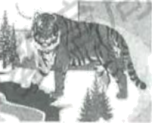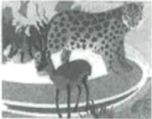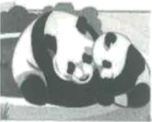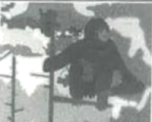Money can’t buy you happiness? Well, what if it could? Not by making it or spending it, but by giving it away.
In an experiment in Switzerland, researchers gave each of the 50 volunteers 20 yuan every week for four weeks and asked half of the volunteers to spend the money on themselves and write down how they spent the money. But researchers asked the other half to spend the money on another person.
After that, all 50 volunteers did the same task in a laboratory. They needed to think of a person who they would like to give money to. Then they had to decide how much money, from 3 yuan to 20 yuan, they wanted to give away. While the volunteers thought about this, researchers studied their brain activity using an MRI machine.
The results showed two things. First, the 25 volunteers who gave their money to others during the four weeks were more generous (慷慨的) and chose to give more money to others in the laboratory task. Second, those same people were much happier than the people who once spent the money on themselves. In the experiment, the volunteers must give money away.
But would you like to do this in your daily life? Can you really make yourself happy by giving? The answer is yes, but remember to start small. You can start by giving £1 to a homeless person. Little by little, you can try to change your habits so you save money to give away. For example, stop buying something that you don’t really need. Then you can save some money and give it to people in need.
Learning to give away money is all about changing the way you behave. It’s about living with less money and being more generous. And this will make you happy.
根据材料内容选择最佳答案。1. How does the writer start the text?
| A.By telling a story. | B.By asking questions. |
| C.By describing a scene. | D.By giving examples. |
| A.Who did the same task in a laboratory. |
| B.How they wanted to spend their money. |
| C.If they wanted to join the experiment. |
| D.How much money they would like to give away. |
| A.Being volunteers. | B.Giving away money. |
| C.Changing your habits. | D.Making yourself happy. |
| A.①②/③④⑤⑥ | B.①/②③④/⑤⑥ |
| C.①②/③④⑤/⑥ | D.①/②③/④⑤⑥ |
| A.“Buy” happiness? | B.“Sell” happiness? |
| C.How to save money? | D.How to be a generous person? |
相似题推荐
【推荐1】Joe is a 75-year-old man. He has four grandchildren, and they all visit him during their holidays. Before they come to visit, Joe cleans the house and buys their favorite foods. But when he is working, he loses his favorite watch. The watch is a gift from his father and Joe loves the watch very much. He is very sad.
When his grandchildren come, they promise (答应) him they will find the watch. One of his granddaughters asks, “Grandpa, do you remember when you see the watch last before it goes missing?”
Joe answers, “I guess I lose it when I am cleaning the barn (谷仓)! ”
The children look for more than two hours but can’t find it. Bob, one of his grandsons, goes to the barn again. The little boy asks the others not to follow him. He is there for about 15 minutes and then he finds the watch!
Joe asks how he can find it. Bob answers, “I just sit there quietly. After a few minutes, I hear the ‘tick, tick’ sound and find the watch.” Joe is happy and thanks the little boy.
This shows that sometimes keeping quiet is very useful. It can help us find a solution!
1. From Paragraph 1, we learn that Joe ________.| A.likes his grandchildren to visit him | B.often helps his grandchildren |
| C.doesn’t want his grandchildren to come | D.doesn’t like doing housework |
| A.In the kitchen. | B.In the barn. | C.In the bedroom. | D.In the dining room. |
| A.He follows other children. | B.He calls his mother. |
| C.He sits quietly and listens. | D.He asks Joe for help. |
| A.难题 | B.客人 | C.办法 | D.观众 |
| A.Joe lost his watch. | B.Helping people makes us feel good. |
| C.Bob is a lucky boy. | D.Keeping quiet is sometimes important. |
【推荐2】One day, an old man was walking past a small pool which was just outside the village. There he found a young boy standing in the pool up to his knees. He bent over, disturbing the water with his hands. Then now and again he would put his face in the water and bring it out again. He then moved to another part of the pool and began the same action.
The old man called out to the boy in surprise, "What are you doing?"
"I am looking for myself," said the boy. "My mother told me that if I looked in the pool, I would be able to see my reflection(倒影)."
"Ha ha!" laughed the old man. "Come here," he said to the boy. He sat down by the pool and told the boy to sit down next to him. "Sit with me for a little while," he continued. "Keep still. You need patience. Just watch."
The silt(泥沙)that had been disturbed by the boy began to once more settle on the bottom of the pool. Finally, the surface of the pool became still and calm, mirror-like.
"Now look," said the old man.
The boy looked, and for the very first time in his life, he saw his own face.
"Boy, remember this valuable lesson," said the old man, "When you are fighting with life's troubles and have forgotten who you are, remember to stop for a while. Then the surface of the pool of life will become still and you will see your reflection in it."
1. What was the boy doing when the old man saw him?| A.Looking for his mother. |
| B.Disturbing the water with his hands. |
| C.Washing his hands in a pool. |
| D.Walking past a pool. |
| A.Surprised | B.Happy | C.Sad | D.Angry |
| A.仍旧 | B.寂静 | C.不动 | D.然而 |
| A.When you meet with troubles, try to make yourself calm for a while. |
| B.Don't fight with life's troubles, or you'll forget who you are. |
| C.You can see your reflection if the water in the pool is clear. |
| D.If you feel tired, always remember to stop for a rest. |
| A.A foolish boy | B.A wise old man | C.The reflection | D.The trouble of life |
【推荐3】
Ladies and gentlemen,
Days before, I received an invitation to give a speech in your school. I’m very glad to be here. Because I know that after studying for a long time, you are all understanding and careful. You are all excellent teenagers who are full of hope for the future. You’ve all grown up so much and I’m so proud of you.
As you know, we human beings are group animals. So I advise you to remember the important people for yourselves in the daily life. They are all the people who are worth trusting. Never forget to thank them.
I’ll also give you some advice on how to solve your problems in the future. There will be many difficult tasks in front of you next. You’ll make mistakes along the way. But remember that making mistakes is usual. What you should do is trying to face them bravely. And along with difficulties,many exciting things are also waiting for you.
As you set out on your new journey, you shouldn’t forget where you come from. The future is yours.
Good luck!
Yours,
Chen Jun
1. Why does Chen Jun come to this school? _________| A.To visit this school. | B.To study in this school. |
| C.To attend a class in this school. | D.To give a speech in this school. |
| A.We should understand them. | B.We should help them. |
| C.We should accept their advice. | D.We should thank them. |
| A.Solve problems alone. | B.Avoid difficult tasks. |
| C.Face mistakes bravely. | D.Wait for exciting things. |

In Darayya, a city in Syria, there’s a library, and it has 15,000 books on almost every subject you can think of. However, it is different from any libraries you know: It is a secret underground library, and only people in Darayya know where it is.
Over the years, war has shaken Darayya badly. Every day, houses are bombed and people are killed. Stores are closed one after another, and so are schools. To help the kids in Darayya with their learning, Anas Ahmad, a 19-year-old student, and his friends decided to build a library. They built the library under the ground to keep it safe from bombing. But it is dangerous to collect books for the library. Often, Ahmad and his friends look for books in houses that were destroyed. They need to be careful because they may be killed in another bombing.
You may ask, “In a place like Darayya, would people be interested in books?” “Just like the body needs food, the mind needs books,” says one library user. In the library, people enjoy their time of reading and forget about the terrible world above, so their life doesn’t seem so hard. Through reading, they are able to dream of a better life after war.
1. What are the books in Darayya’s library on?| A.Every subject. | B.War and Peace. | C.Science and arts. | D.Animals. |
| A.Some foreigners. | B.A student and his friends. |
| C.The local government. | D.Some teachers. |
| A.The teachers give away their books. |
| B.The students buy books from different countries. |
| C.The volunteers send books to the students every year. |
| D.The students collect books from houses that were destroyed. |
| A.It’s safe to stay there. | B.The teachers give lessons there. |
| C.They find hope by reading. | D.They can get free lunches there. |
①How Darayya’s library helps people. ②The situations and problems in Darayya.
③How Darayya’s library was started. ④What makes Darayya’s library special.
| A.③-①-②-④ | B.④-②-③-① | C.①-④-③-② | D.③-②-④-① |
【推荐2】One bright morning, I was out for my usual run when I met an elderly lady who was waving her phone at me and speaking in a language I couldn’t understand. It sounded like she was in a hurry to get somewhere. I quickly realized that she was lost and couldn’t speak any English.
She showed me some map screenshots on her phone, but I had no clue (线索) how to read them. So, I quickly downloaded a translation app and we used the app to communicate. She spoke into the microphone (麦克风) in her language and it translated her words into English for me to understand. I typed my responses and we were able to communicate!
I soon figured out that she needed to get home, which was a long walk away. She didn’t want to use any transportation but I offered to walk her to a bus stop where she could call her daughter for a ride. As we walked, we laughed and joked, even though we couldn’t understand each other’s language. It was a pretty fun experience!
The elderly lady was very grateful for my help and kept thanking me for my time. I had to keep reminding her that it was no trouble at all and that I was happy to help. It was amazing how just a small act of kindness made such a big difference to her.
Finally, we reached the bus stop and she made her call. We said our goodbyes and she gave me a heartwarming message that made me believe in the goodness of humanity (人性). Even though we used technology to communicate, it was lucky that we could help each other out and not be stopped by our different languages.
Choose the best choice from A, B or C according to the passage.1. What did the elderly lady show the writer on her phone?
| A.Photos of her daughter. | B.Pictures of a map. | C.A video of her house. |
| A.They spoke in English. | B.They used sign language. | C.They used a translation app. |
| A.She drove her home. |
| B.She walked her to a bus stop. |
| C.She made a call to her daughter. |
| A.弄明白 | B.疑惑 | C.承认 |
| A.The importance of learning a foreign language. |
| B.The value of developing technology. |
| C.The power of small acts of kindness. |
【推荐3】Clara Daly was sitting on an Alaska Airlines flight from Boston to Los Angeles when she heard a worried voice over the loudspeaker: “Does anyone on board know American Sign Language?”
Clara, 15 at that time, pressed the call button (按钮). An air hostess came by and explained the situation. “We have a passenger on the plane who’s blind and deaf,” she said. The passenger (乘客) seemed to want Something, but he was traveling alone and the air hostesses couldn’t understand what he needed.
Clara had been studying ASL for the past year to help blind and deaf people and she knew she’d be able to finger spell into the man’s palm (手掌). So she rose from her seat, walked toward the front of the plane, and knelt (跪) by the seat of the passenger named Tim Cook, then 64 years old. Gently taking his hand, she signed, “How are you? Are you OK?” Cook asked for some water.
When the water arrived, Clara returned to her seat. She came by again a bit later because he wanted to know the time. On her third visit, she stopped and stayed for a while.
“He didn’t need anything. He was lonely and wanted to talk,” Clara said.
So for the next hour, she “talked” about her family and her plans for the future. Cook “told” Clara how he had become blind over time and shared stories of his days as a traveling salesman. Even though he couldn’t see her, she “looked attentively at his face with such kindness,” a passenger reported.
“Clara was amazing,” an air hostess said in an interview. “You could tell Cook was very excited to have someone he could speak to, and she was such an angel.”
Cook’s reply: “Best trip I’ve ever had.”
1. What was the air hostesses’ problem?| A.They had a very difficult passenger. |
| B.They couldn’t understand the passenger. |
| C.They didn’t know the passenger’s name. |
| D.They didn’t have what the passenger wanted. |
| A.Because she happened to learn some ASL. |
| B.Because she had helped people like Cook. |
| C.Because she thought she might know Cook. |
| D.Because her grandfather had the same problem. |
| A.Because he was hungry and thirsty. |
| B.Because he needed someone to talk to. |
| C.Because he was afraid of taking planes. |
| D.Because he was interested in Clara’s story. |
| A.Brave and clever. | B.Beautiful and lovely. |
| C.Patient and caring. | D.Outgoing and friendly. |
People keep dogs and cats because they enjoy their friendship. Fish may not be friendly, but they have beautiful shapes(形状) and colours. It is a pleasure to watch them as(当……的时候) they swim in their tanks. What do they need? First of all, the fish need a suitable(合适的) tank, and you must fill(装满) the tank with suitable water. It is also good for them to have a few water plants in the tank to keep(保持) the water pure. Putting a few snails(蜗牛)in the lank is a good idea, too. They will keep the water clean. What about feeding(喂养) them? There are many kinds of fish food that you can get in pet shops. Most are suitable for all kinds of fish. You should feed your fish once a day. It is important not to give them too much food. Just give them as much as they can eat in about 15 minutes. This will keep them healthy.
1. Why do people keep dogs and cats?| A.Because they are strong. | B.Because they are cute. |
| C.Because they are friendly. | D.Because they are small. |
| A.Because they have beautiful shapes and colours. |
| B.Because they can smile to people. |
| C.Because their shapes are strange. |
| D.Because they are always happy . |
| A.keep the water full | B.keep the water pure and clean |
| C.keep the water clean and useful | D.make the tank beautiful |
| A.Give them as much food as possible . |
| B.Feed them once a day and give them as much as they can eat. |
| C.Feed them once a day and give them as much as they can eat in 15 minutes. |
| D.Feed them twice a day. |
| A.How to Keep Cats at Home | B.How to Keep Animals at Home |
| C.How o Keep Dogs at Home | D.How to Keep Fish at Home |
【推荐2】China has made great achievements in biodiversity protection. Building a national park system is one of the greatest jobs that China has done so far. In October 2021, China’s first five national parks were designated (认定). They are home to nearly 30% of the earth’s key wildlife species (物种) found in China, covering a protected land area of 230,000 square kilometers. This table will inform you of the first five national parks—China’s treasures in nature.
Leopard National Park | Locations: Heilongjiang and Jilin provinces Landscapes: Mountains, hills, and valleys Representative species: Siberian tiger, Amur leopard (豹) Progress: Increasing population of protected animal species from the year of 2015 to 2022—Siberian tigers: 27→50; Amur leopards: 42→60 |
Sanjiangyuan National Park | Locations: Qinghai Province and Xizang Autonomous Region Landscapes: Glaciers, snow-capped mountains, high-altitude wetlands, deserts, alpine grasslands Representative species: Snow leopard, Tibetan antelope Progress: At present, the vegetation coverage of the grassland in the park has been over 60%, which is nearly 5% higher than that in 2015. |
Giant Panda National Park | Locations: Sichuan, Shaanxi and Gansu provinces Landscapes: Mountains, basins Representative species: Giant panda, red panda Progress: It is protecting over 70% of the wild giant panda population in the country. The population of protective animals in the park—Giant pandas 50+; Sichuan takins 1,300+ |
Wuyishan National Park | Locations: Fujian and Jiangxi provinces Landscapes: Mountains Representative species: Chinese pangolin, Cabot’s tragopan Progress: Through reasonable development of 10% of its area, the park has holds its biodiversity conservation in 90% of its area under protection. |
National Park | Locations: Hainan Province Landscapes: Mountains Representative species: Hainan black crested gibbon Progress: The population of Hainan’s black crested gibbon in the wild—1970s: 2 groups of 7 individuals (个体); At present: 5 groups of 36 individuals |
| A.When China’s first five national parks were discovered. |
| B.Some general information of China’s first five national park! |
| C.What challenges China’s first five national parks are facing. |
| D.Some actions to protect the wildlife species in these parks. |
【推荐3】On Saturday night, a five-person team of the Chinese e-sports club EDG, won the 2021 LoL (英雄联盟) World Championship in Reykjavik, Iceland.
LoL and Honor of Kings (王者荣耀) are popular games liked by both teenagers and adults. People of different ages prefer different games. Here is the result.

Teenagers are fond of (喜欢) mobile games, but some of them spent too much time on it. They wasted their time and their eyes were affected (影响). In Jinbu county of Jiangsu Province a left-behind student in the countryside even refused books and wrote to volunteers to ask for mobile phones for playing Honor of Kings. Nowadays, students are only allowed to play for one and a half hours each day. The point is not to stop children from playing video games, but to protect them.
根据短文和图表内容,选择最佳答案。
1. EDG is ________.
| A.a man’s name | B.a game’s name | C.a team’s name | D.a teenager’s name |
| A.0—19 | B.20—29 | C.30—39 | D.40—49 |
| A.28 percent | B.32 percent | C.2 percent | D.52 percent |
| A.homework to do | B.books to read |
| C.mobile phones to play games | D.balls to play with |
| A.teenagers are not allowed to play computer or mobile games |
| B.teenagers should plan their time of playing computer and mobile games properly |
| C.teenagers should be allowed to play computer and mobile games |
| D.reading books is the only thing teenagers should do |








